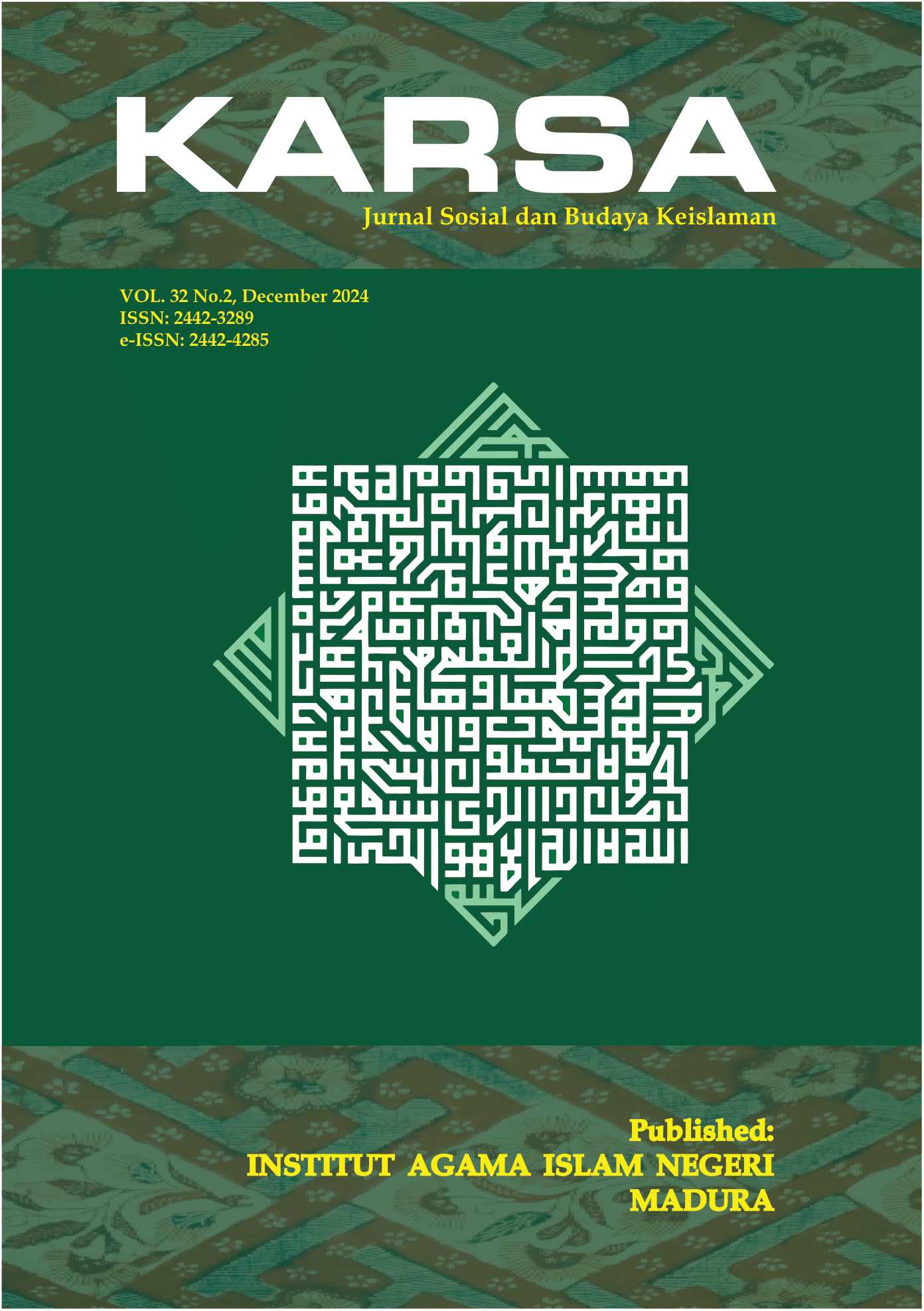Thailand Islamic Community Perspective Towards the Ratification of LGBTQI++
 Abstract views: 323
,
Abstract views: 323
,
 PDF downloads: 107
PDF downloads: 107
Abstract
The Marriage Equality Bill in Thailand will officially take effect on January 22, 2025. With this enactment, Muslims in Thailand will certainly have perspectives and attitudes concerning the youth in Islam in facing this issue. This study aims to explore the views of Islamic religious teachers regarding students in light of the legalization of LGBTQI++ in Thailand. To gather this information, a questionnaire with a 5-point Likert scale was distributed to 12 Islamic religious teachers at Sasana Business Administration Vocational College in Bangkok. The primary source of this study consists of data from the questionnaire, while secondary sources include relevant research articles that support this research article. The results indicate that almost all Islamic religious teachers are opposed to the enactment of this policy. They believe it will impact students' identity, characteristics, and religious morality as the young Muslim generation in Thailand. Therefore, they propose plans to provide education on these issues through communication strategies and open discussions.
Downloads
References
Abdullah bin Muhammad bin Abdurahman bin Ishaq Al-Sheikh. Tafsir Ibnu Katsir Jilid III. Edited by Abdul Ghoffar. II. Bogor: Pustaka Imam asy-Syafi’i, 2003.
Abshire Saylor, M., C. Benjasirisan, S. Kruahong, A. Lim, J. Gill, S. L. Szanton, and B. Koirala. “A Contemporary Review of Psychosocial Resilience in Heart Failure Using the Society to Cells Resilience Theory.” Current Geriatrics Reports 12, no. 4 (2023): 176–94. https://link.springer.com/article/10.1007/s13670-023-00398-0
Andi, Muliastuti. “Aktivisme Transnasional dalam Prakarsa Being LGBT in Asia: Mobilisasi Gerakan dan Pembentukan Identitas Kolektif.” Jurnal Hubungan Internasional 15, no. 2 (November 29, 2022): 398–419. https://doi.org/10.20473/jhi.v15i2.35109.
Brown, Melissa, Roger S Brown, and Ankur Nandedkar. “Transformational Leadership Theory and Exploring the Perceptions of Diversity Management in Higher Education.” Journal of Higher Education Theory and Practice 19, no. 4 (2019). https://doi.org/10.33423/jhetp.v19i7.2527
Craig, Robert T., and Bingjuan Xiong. “Traditions of Communication Theory and the Potential for Multicultural Dialogue” 17, no. 1 (2022): 1–25. https://doi.org/10.1080/17447143.2021.2009487
Dhamayanti, Febby Shafira. “Pro-Kontra Terhadap Pandangan Mengenai LGBT Berdasarkan Perspektif HAM, Agama, dan Hukum di Indonesia.” Ikatan Penulis Mahasiswa Hukum Indonesia Law Journal 2, no. 2 (February 24, 2022): 210–31. https://doi.org/10.15294/ipmhi.v2i2.53740.
Fitriyah, Aidatul, and Muhammad Badat Alauddin. “Comparison of Islamic Law and Human Rights; Navigating Consensus of LGBT in Thailand.” Indonesian Journal of Law and Islamic Law (IJLIL) 6, no. 1 (June 2024): 22–37. https://doi.org/10.35719/ijlil.v6i2.406.
Hasaruddin. “Perkembangan Sosial Islam di Filipina.” Al Ma’ Arief: Jurnal Pendidikan Sosial dan Budaya 1, no. 1 (2019): 32–43. https://doi.org/10.35905/almaarief.v1i1.782
Harahab, Rustam DKA. “LGBT di Indonesia: Perspektif Hukum Islam, HAM, Psikologi dan Pendekatan Maṣlaḥah.” AL-AHKAM 26, no. 2 (October 2016): 223–48. https://doi.org/10.21580/ahkam.2016. 26.2.991
Kalra, Ashish, Na Young Lee, and Riley Dugan. “Exploring Antecedents and Outcomes of Salesperson Change Agility: A Social Exchange Theory Perspective.” Journal of Marketing Theory and Practice 32, no. 3 (2024): 290–310. https://doi.org/10.1080/10696679.2023.2169940.
Kementerian Urusan keislaman, Wakaf, Dakwah dan Penyuluhan. Tafsir Al-Muyassar. V. Madinah: Mazidah dan Munfaha, 2013.
Luo, Jian, Xiao Bo Liu, Qian Yao, Yi Qu, Jin Yang, Ke Lin, Shi Rong Pan, et al. “The Relationship between Social Support and Professional Identity of Health Professional Students from a Two-Way Social Support Theory Perspective: Chain Mediating Effects of Achievement Motivation and Meaning in Life.” BMC Medical Education 24, no. 1 (December 2024): 1–16. https://doi.org/10. 1186/s12909-024-05391-5.
Mentari Noor’aini, Audy, and Chazizah Gusnita. “Analisis Labelling Terhadap Kelompok Lesbian, Gay, Biseksual, Transgender (LGBT) Dalam Lingkungan Sosial Masyarakat.” Jurnal Anome 3, no. 1 (April 2021): 60–77. https://jom.fisip.budiluhur.ac.id/ index.php/anomie/article/view/495
Mohammadi, Moloud. “Digital Information Literacy, Self-Directed Learning, and Personal Knowledge Management in Critical Readers: Application of IDC Theory.” Mohammadi Research and Practice in Technology Enhanced Learning. Vol. 19, 2024.
Ojanen, Timo T., Rattanakorn Ratanashevorn, and Sumonthip Boonkerd. “Gaps in Responses to LGBT Issues in Thailand: Mental Health Research, Services, and Policies.” Psychology of Sexualities Review 7, no. 1 (2016): 41–59. https://doi.org/ 10.53841/bpssex.2016.7.1.41
Paisley, Varina, and Mark Tayar. “Lesbian, Gay, Bisexual and Transgender (LGBT) Expatriates: An Intersectionality Perspective.” International Journal of Human Resource Management 27, no. 7 (April 2016): 766–80. https://doi.org/ 10.1080/09585192.2015.1111249.
Qorib, Muhammad, and Umiarso Umiarso. “Dinamika Kaum LGBT, Pendidikan Keislaman, dan Sikap Kemanusiaan: Studi Fenomenologi di Perguruan Tinggi di Malang.” Jurnal Pendidikan Agama Islam (Journal of Islamic Education Studies) 7, no. 2 (July 2020): 125–42. https://doi.org/10.15642/jpai.2019.7.2.125-142.
Shuvaev, S., E. Amelchenko, D. Smagin, N. Kudryavtseva, G. Enikolopov, and A. Koulakov. “A Normative Theory of Social Conflict.” In 37th Conference on Neural Information Processing Systems, edited by Oh A., Neumann T., Globerson A., Saenko K., Hardt M., and Levine S., 45581–601. Neural Information Processing Systems Foundation, 2023.
Shwed, Uri, Yuval Kalish, and Yossi Shavit. “Multicultural or Assimilationist Education: Contact Theory and Social Identity Theory in Israeli Arab–Jewish Integrated Schools.” European Sociological Review 34, no. 6 (December 2018): 645–58. https://doi.org/10.1093/esr/jcy034.
Songtaweesin, Wipaporn Natalie, Sara LeGrand, Shashika Bandara, Caitlin Piccone, Prissana Wongharn, Juthamanee Moonwong, Thidarat Jupimai, et al. “Adaptation of a Theory-Based Social Networking and Gamified App-Based Intervention to Improve Pre-Exposure Prophylaxis Adherence among Young Men Who Have Sex with Men in Bangkok, Thailand: Qualitative Study.” Journal of Medical Internet Research 23, no. 11 (November 2021). https://doi.org/10.2196/23852.
Tan, Kyle K.H., and Andrew T.W. Saw. “Prevalence and Correlates of Mental Health Difficulties amongst LGBTQ People in Southeast Asia: A Systematic Review.” Journal of Gay and Lesbian Mental Health 27, no. 4 (2023): 401–20. https://doi.org/10.1080/ 19359705.2022.2089427.
White, John. “Philosophy of Education in the World of Twenty-First Century Capitalism: A Response to My Theory and Research in Education Critics.” Theory and Research in Education 13, no. 2 (2015): 225–34. https://doi.org/10.1177/1477878514552893.
Yesmin, Mst Nirufer, Md Alamgir Hossain, Md Saiful Islam, Md Mostafizur Rahman, Nusrat Jahan, and Minho Kim. “Entrepreneurial Intentions and the Role of Educational and Social Support: Do the Self-Efficacy and the Theory of Planned Behavior Variables Matter?” RAUSP Management Journal, 2024. https://doi.org/10.1108/RAUSP-03-2024-0053.
The journal operates an Open Access policy under a Creative Commons Non-Commercial Share-Alike license. Authors who publish with this journal agree to the following terms:
- Authors retain copyright and grant the journal right of first publication with the work simultaneously licensed under a Creative Commons Attribution License that allows others to share the work with an acknowledgement of the work's authorship and initial publication in this journal.
- Authors are able to enter into separate, additional contractual arrangements for the non-exclusive distribution of the journal's published version of the work (e.g., post it to an institutional repository or publish it in a book), with an acknowledgement of its initial publication in this journal.
- Authors are permitted and encouraged to post their work online (e.g., in institutional repositories or on their website) prior to and during the submission process, as it can lead to productive exchanges, as well as earlier and greater citation of published work.



















